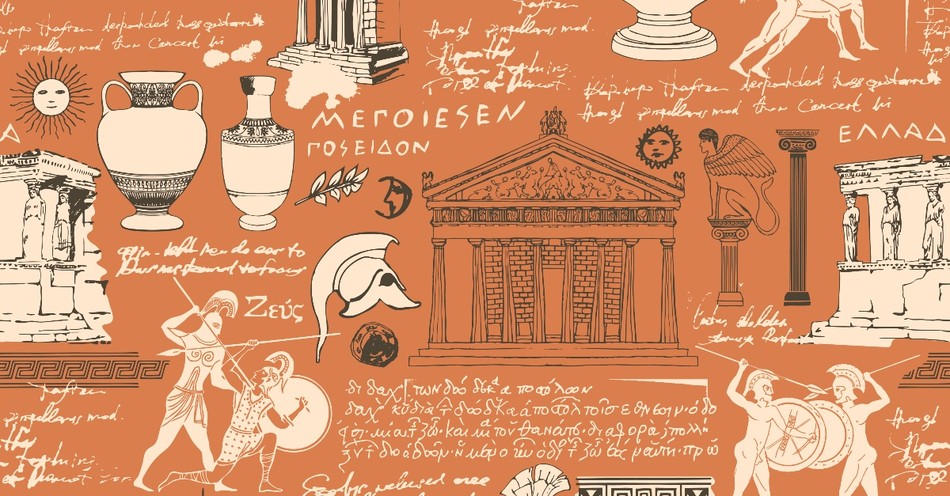God, who made the world and everything in it, since He is Lord of heaven and earth, does not dwell in temples made with hands. Nor is He worshipped with men’s hands, as though He needed anything, since He gives to all life, breath, and all things. And He has made from one blood every nation of men to dwell on all the face of the earth, and has determined their pre-appointed times and the boundaries of their dwellings, so that they should seek the Lord, in the hope that they might grope for Him and find Him, though He is not far from each one of us; for in Him we live and move and have our being, as also some of your own poets have said, “For we are also His offspring.”
Therefore, since we are the offspring of God, we ought not to think that the Divine nature is like gold or silver or stone, something shaped by art and man’s devising. Truly, these times of ignorance God overlooked, but now commands all men everywhere to repent, because He has appointed a day on which He will judge the world in righteousness by the Man whom He has ordained. He has given assurance of this to all by raising Him from the dead (Acts 17:24–31).
The Apostle Paul gave this speech during his visit to Athens, Greece. At that time in history, the Greeks genuinely believed in and worshipped the gods we read about in mythology books. To us, it seems ludicrous to worship the same gods in Rick Riordan’s Percy Jackson series, who play Pac-Man and wear Hawaiian-print shirts (Dionysus- the god of wine), but that was the reality Paul faced and had to combat in Athens.
In the passage quoted above, Paul makes a comparison between the Greek gods and the one true God. Working through some of the differences, Paul points can help us confirm why, exactly, we believe what we believe about God.
God Made the Whole World Himself
The Greek creation myth goes roughly like this: Gaea and Uranus — primordial beings that mysteriously appeared out of nothing — didn’t create the world so much as become the world. Gaea became the earth, and Uranus became the sky. Gaea and Uranus’s grandchild, Zeus, carried on “creating” by divvying up the portions of the world among his five siblings and the children they eventually had.
In stark contrast to Gaea and Uranus, there was never a point where God didn’t exist; He always was and always will be. Additionally, He didn’t rely on anyone else to create the world. He simply spoke, and it happened, and it was all very good (Acts 17:24-25).
God Actively Watches Over and Cares about Us
In the myths, the Greek gods were absolutely awful to mortals. Zeus only cared about mortals if they were young and pretty. Hera only interacted with mortals when Zeus cheated on her with them. Athena turned a skilled weaver into the first-ever spider just because the weaver was a little cocky. Apollo murdered the mortal hunter Orion with a scorpion because he was jealous of how much time Orion and Artemis were spending together.
God, on the other hand, is completely invested in our lives and doesn’t toy with our fates for His own amusement. Instead, He loves us and stays with us from the moment He puts us together in the womb to the moment we die and join Him in Heaven (Acts 17:26-27).
God Is Greater Than Any Idol
Museums are chock-full of statues and carvings of the Greek gods. Those statues were made to draw attention to the power and might of the Greek pantheon. And since the Greeks’ main objective in life was to avoid angering the gods, you basically couldn’t walk ten steps without seeing the idol of some god or other.
The fundamental problem with idols is the mindset behind them: The assumption that a human can or should capture even a small part of a deity’s greatness with a lump of metal, stone, or wood.
God and Paul make it very clear that the Lord is more real and bigger and better than even the most beautiful, intricate statue of Zeus or Aphrodite could be. He lives, breathes, moves, loves, and acts, all of which idols and the gods they represent could never hope to do because they are lifeless and false (Acts 17:24, 29).
God Gives Us a Real, Tangible Reason to Have Hope
The mindset of the Greek gods is a rather bleak and hopeless one: The gods themselves are amoral, selfish, prideful beings who either ignore mortals or wreak havoc on their lives to punish minor offenses. Worshiping such fickle gods leads to a life dominated by the fear of angering some deity or other.
God brought His son back from the dead so that humanity could be released from that fear. Because Jesus died for us, rose again, and invited us all to believe in Him, we have a way out. And that’s what Paul offers to the Athenians: A Savior who loves and rescues them the way their gods would never deign to, even if they were real (Acts 17:31).
Photo Credit: ©iStock/Getty Images Plus/paseven





